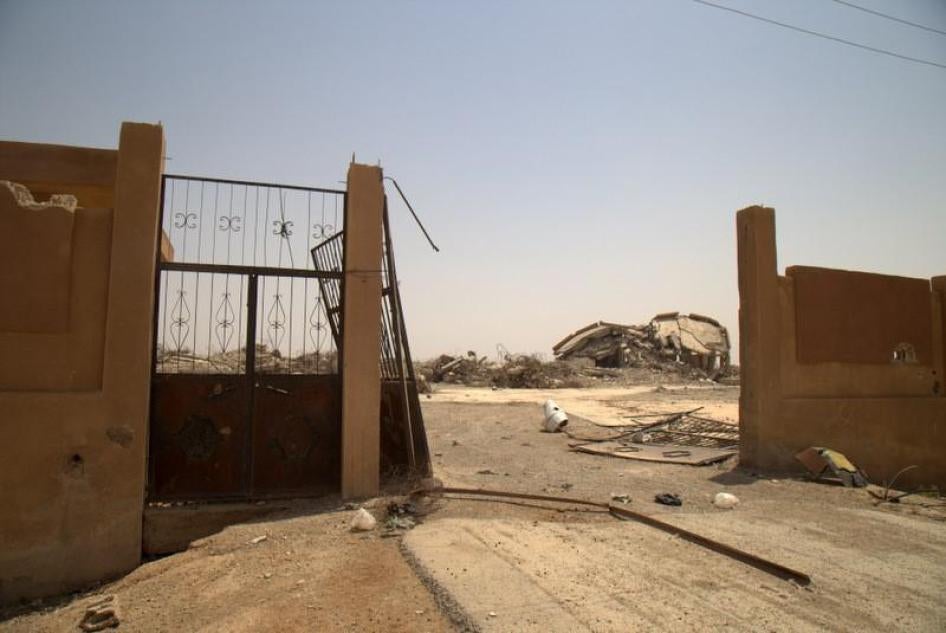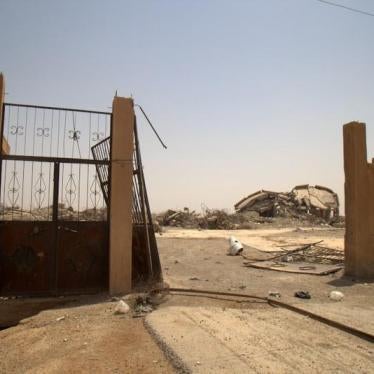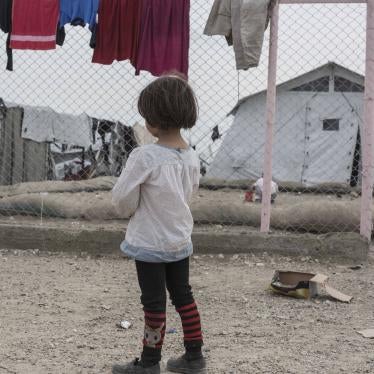It finally admitted to it. After months of denying that any civilians died, the United States-led coalition in Syria has finally recognized that its strike on a boarding school in Mansourah, near Raqqa, Syria, on March 20, 2017, killed dozens of civilians.
In its latest “monthly civilian casualty report” issued on June 28, the coalition noted that its reporting of the attack “was reopened after the receipt of new evidence from Human Rights Watch. During a strike on Daesh (Islamic State, also known as ISIS) militant multifunctional center allegedly caused civilian casualties. Forty civilians were unintentionally killed.” The coalition also indicated that it would reopen investigations into other strikes following reports by Amnesty International and Airwars.
As the terrorism and counterterrorism director at Human Rights Watch, I have been working for the US to recognize the harm it caused civilians in the Mansourah strike for almost a year, following our July 2017 visit to the school, where we gathered overwhelming evidence that the coalition killed dozens of civilians when it bombed the site. For over a year, the coalition maintained that no civilians were harmed.
Yet, this moment does not feel like a victory or even sufficient recognition of what actually happened that day by the coalition.
While I appreciate that the coalition reviewed our evidence, we don’t know what sort of investigation it conducted that led them to finally change the findings. The coalition simply notes that “the investigation assessed that although all feasible precautions were taken and the decision to strike complied with the law of armed conflict, unintended civilian casualties regrettably occurred.”
It is hard to be convinced by their findings without more transparency around the process of investigation and the information available to them. If all feasible precautions had been taken – as the coalition alleges and as is required under international law – shouldn’t they have known that hundreds of displaced civilians had been living in this school?
In a May 2017 media briefing, Lt. Gen. Jeffrey Harrigian, commander of US Air Force Central Command, explained how the coalition selects its targets: “Deliberate targeting involves an extensive development process to ensure each one is legitimate and meets established strike criteria. This process can take from days to weeks to develop, depending on the target and the time needed to observe daily patterns of life and behavior.” For each target, the military also conducts a Collateral Damage Estimation (CDE), a process to predict and mitigate harm to civilians or civilian property.
If these procedures were followed, then at best, there was a major – and deadly – blunder. All locals knew that displaced civilians had been living in the school since the early days of the uprising against Syrian President Bashar al-Assad. Witness statements we collected suggest that aerial monitoring of the school over time would have shown civilian activity. For example, an 11-year-old survivor told us that children used to play in the school’s courtyard, which would have probably made them visible to any aerial surveillance. A more transparent investigation would shed light on what went terribly wrong that day and would help ensure that such mistakes do not occur in the future.
Other parts of the coalition’s reporting also raise questions about the seriousness of the investigation. It characterizes the school as “a Daesh militant multifunctional center” without explaining what other “functions” the school had. Local residents said that displaced civilians had been living in the school as early as 2012. In the period leading up to the strike, families of ISIS fighters fleeing Iraq also began living in the school. Witnesses told us that ISIS fighters would come to visit their families living there. One witness said that ISIS had set up a mosque inside the school compound. Is that what the coalition had in mind when it said it was a “multifunctional center” for ISIS fighters?
The UN Commission of Inquiry for Syria, set up to investigate violations of international law in Syria since 2011, issued a report on March 6 and came to a conclusion similar to ours about civilians being harmed in the Mansourah strike. After interviewing 20 witnesses, the commission found that the information it collected “does not support the claim that 30 [ISIS] fighters were in the school at the time of the strike, nor that the school was otherwise being used by [ISIS].”
There are also questions about how the coalition arrived at the number of civilians killed, which it said was 40. Human Rights Watch listed the names of 40 civilians but indicated that those were the ones we were able to identify by name – an arduous task when dealing with victims who are displaced from other areas. We said we believed, based on the number of people buried, that the actual number killed was higher. The UN commission said that 150 of the 200 people living in the school were killed and identified 12 survivors, including four women and six children.
But on a more fundamental level, the coalition’s statement misses a key element: It fails to address the victims. The US-led coalition should take responsibility when its attacks kill civilians. In the event of violations, international law requires compensation for civilian victims. But even in the absence of a determination of illegality, civilians will need assistance or redress and there are strong arguments to be made to try to address the harm caused. This can take the form of payments for loss of civilian life and property – often known as ex gratia payments that are made without legal obligation, as well as non-monetary acknowledgement of the harm done, such as apologies.
The coalition has not created any procedure for civilian victims of its attacks in Syria or their surviving relatives to obtain any form of redress. Two of the children who survived the Mansourah strike have been taken in by their aunt, who is herself a refugee, living in a cramped space in Beirut. She is an impressive woman, who has battled bureaucracies to get them into school. Yet, she is always one rent away from being kicked out of their housing.
These children deserve an explanation regarding the strike that decimated their family and the coalition should provide them with some form of redress. A two-line statement saying that “40 civilians were killed” is simply not enough.








